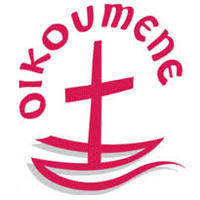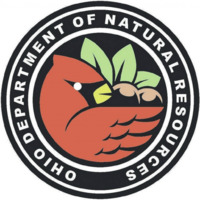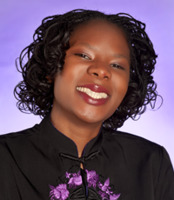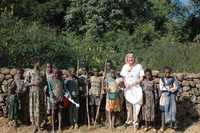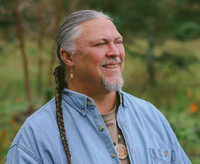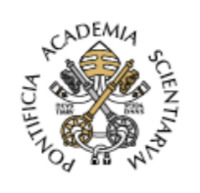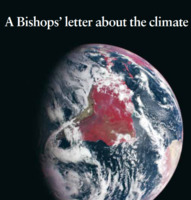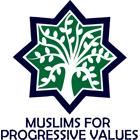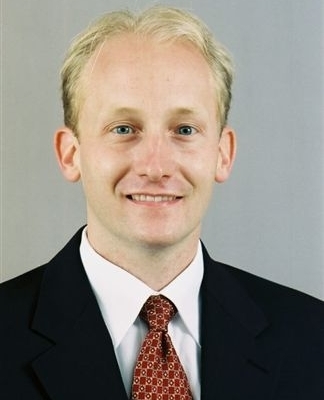Search
33 items
-
Pope Francis and Environmental Leaders Forge Vision for Global Action
Environmental leaders, activists and advocates gathered with Pope Francis for a two-day Vatican-organized conference with hopes to emerge with a shared vision for protecting our planet. The conference was inspired by the third anniversary of the Pope’s encyclical and was attended by political and religious leaders, scientists, economists and heads of civil society organizations. Inspired by the call for unity and action in the encyclical, UN Environment also introduced their Interfaith Rain-forest Initiative at the conference. -
WCC Executive Committee: global biodiversity crisis reaches urgent level
This article from the World Council of Churches discusses the current biodiversity crisis. The majority of land surfaces and ocean areas are significantly modified, and over 85% of the wetlands are gone. The following excerpt notes how this subsequently affects the poor and vulnerable:
"The statement notes that, increasingly, the drive for relentless expansion built into dominant economic systems are endangering the survival of many of God’s creatures. 'Ultimately our significant and adverse impacts on ecology will impact humanity’s own future,' the statement reads. 'Already they are destroying the very basis of sustenance of our income-poor, vulnerable and Indigenous sisters and brothers, who contribute least to the ecological damage for which human beings are collectively responsible.'" -
Interfaith Rainforest Initiative
From the organization's website: "The Interfaith Rainforest Initiative is an international, multi-faith alliance that aims to bring moral urgency and faith-based leadership to global efforts to end tropical deforestation. It is a platform for religious leaders to work hand-in-hand with indigenous peoples, governments, civil society and business on actions that protect rainforests and safeguard those that serve as their guardians." The initiative focuses on raising awareness, mobilizing action, and influencing policy. -
Engaged Organizations: Stratford Ecological Center
The Stratford Ecological Center is an organic farm and nature preserve that provides education sessions, tours, and hiking trails to the public. They also offer various workshops and classes on an ongoing basis.
Trinity Catholic Elementary School 4th and 5th graders participation each year in a 5-day environmental camp "Messages of the Earth" at the Stratford Ecological Center. -
Engaged Organizations: Kenyon College Brown Family Environmental Center
The Brown Environmental Center at Kenyon College offers both self-guided and educational sessions that showcase their diverse range of natural habitats that are maintained at the center.
St. Vincent de Paul in Mt. Vernon, Ohio makes annual trips for their K-6 students. -
Christians and Endangered Species
Throughout time, it has often been difficult to reconcile concepts from both biology and theology. This article focuses on the critical impact of endangered species with regard to various Christian religions. Citing biblical text, especially the story of Noah’s Ark, many religions have deemed the preserving and caring for all living creatures to be of utmost importance. -
Profile: Melanie Harris
Dr. Melanie L. Harris is Associate Professor of Religion at Texas Christian University in Fort Worth, TX . There, she teaches and conducts research in the areas of Religious Social Ethics, African American Religion and Environmental Justice. She is a GreenFaith Fellow and co-director of Earth Honoring Faith with Ghost Ranch Education and Conference Center. Dr. Harris is currently a member of the Board of Directors of KERATV/Radio in Dallas and facilitates contemplative retreats as a licensed Spiritual Director. She is the author of Gifts of Virtue: Alice Walker and Womanist Ethics (Palgrave), as well as coeditor of the volume Faith, Feminism, and Scholarship: The Next Generation (Palgrave) and editor of Ecowomanism: Earth Honoring Faiths (Brill).
Along with Dr. Jennifer Harvey, Dr. Harris conducts workshops about racial justice, womanist ethics and environmental justice. She has presented to audiences in the AME, United Church of Christ, and Baptist church traditions. -
Tu' B'Shvat: The Green of Judaism
Tu B’Shvat: The Greening of Judaism is a handout from Interfaith Family. It offers a brief overview of Tu B’Shvat and different activities to celebrate the holiday. It also offers examples of how to be caretakers of the earth. To read the entire handout, click below. -
Ethiopia’s Church Forests
The beautiful forests of Ethiopia are rapidly disappearing due to human activity. However, the forests around the Ethiopian churches remain intact and teeming with diverse life. Dr. Margaret D. Lowman, known as Canopy Meg, has teamed up with one of these churches to study and survey the wildlife, mostly insects in the area. The children of the church community are being engaged to become the next generation of stewards in order to ensure that the forests and creatures are preserved. Project leaders also aim to help build walls in order to keep these forest areas more protected from human development. -
Decolonizing Thanksgiving
"As we head into the Thanksgiving holiday weekend in the United States, it’s great to think about all the things we can be grateful for. It is good to have a time to pause and reflect, to participate in the seasonality of gratitude for the year’s bountiful harvest, and to gather with family and friends. (We’ll ignore the über-consumerism of the day following Thanksgiving…)
Many of us probably know by now, however, that the story many of us learned in school about the first Thanksgiving is rather inaccurate at best, and racist and paternalistic in many ways, with a focus on the Manifest Destiny idea of the divine mandate for Europeans to conquer the “New World” in the name of Christ and country.
A few questions come to mind (at least my mind), for those of us with European-American roots, such as:
Should we even celebrate Thanksgiving, since it’s so tainted with colonialism?
What might it look like to “decolonize” our own understandings and our culture?
How can we do this work in a way that encourages our own folks to partner, rather than making them (our White brethren) feel further ostracized, but while also speaking real truth?
What can we do this Thanksgiving to begin to reconcile relationships damaged in the colonial era, both human to human and human to this land?" -
MLK Day 2024
"ServeOhio Funds 19 Statewide Service Projects Taking Place in celebration of MLK Day
These grants support more than 1,300 volunteers engaging in local community service projects across fifteen Ohio cities
ServeOhio, the Governor-appointed commission on service and volunteerism, announces grant awards to support 19 local Martin Luther King Jr. Day of Service projects throughout January totaling more than $25,000. Much like Dr. King’s legacy, these grants will help nonprofits across the state improve their communities through service and volunteer activities. The grants will fund service projects in fifteen Ohio cities led by more than 1,300 volunteers.
Each project commits to bringing volunteers together to create or improve community assets or infrastructure and supports local community engagement and impact. Additionally, every project includes an education component based on Dr. King’s message of peace, unity, and service to create long-term, sustainable change.
ServeOhio awards these grants with support from the American Electric Power Foundation. Each grant totals between $250 - $1,500." -
Engaged Organizations: A Rocha International
A Rocha International discuss their mission on their website:
"At A Rocha USA, our mission is to restore both people and places through collaborative, community-based conservation.
We resource Christians to care for creation where they live by building a network of hands-on conservation projects in communities across the nation. Through partnerships with individuals, churches, and community groups, we provide content, curriculum, and a network of support for improving local habitats and increasing biodiversity." -
Engaged Organizations: Catholic Association of Diocesan Ecumenical and Interreligious Officers
The following is an excerpt from the Catholic Association of Diocean Ecumenical and Interreligous Officers' call to care for creation on their website:
"Catholics now realize that the environment is equally as important as the social issues that have been given attention in the Church and that in fact, certain of these issues are tied inextricably to our care of the earth or lack thereof. Can even one individual live without clean air, water, or food? Can any life be protected without concern for the basic systems and networks required to sustain life? If we “teach a man to fish” but the water is so polluted that fish are poisoned or if overfishing causes them to become extinct, what then?
Catholics in past centuries were not concerned about air, water, soil and climate for the simple reason that these life systems were not endangered. Clergy and faithful had no need to be worried that the water, wheat, or grapes required for our sacramental life might be dangerously polluted or ruined by climate extremes. Current threats to creation are a sign of our times." -
Baha'i Faith Statement on the Environment
The Interfaith Center for Sustainable Development posted a Baha'i faith statement, from the Baha'i Office of the Environment, on their website. Below is the introduction within the statement:
"In this age of transition toward a world society, protection of the environment and conservation of the earth’s resources represent an enormously complex challenge. The rapid progress in science and technology that has united the world physically has also greatly accelerated destruction of the biological diversity and rich natural heritage with which the planet has been endowed. Material civilization, driven by the dogmas of consumerism and aggressive individualism and disoriented by the weakening of moral standards and spiritual values, has been carried to excess.
Only a comprehensive vision of a global society, supported by universal values and principles, can inspire individuals to take responsibility for the long-term care and protection of the natural environment. Baha’is find such a world-embracing vision and system of values in the teachings of Baha’u’llah, which herald an era of planetary justice, prosperity, and unity. " -
Judaism Ecology
Interfaith Center for Sustainable Development posted a statement of Judaism ecology, based on the Windsor Statements, on their website. Key points include a warning with regard to altering creation, wasteful destruction, and the urgency for preservation. -
North American Pollinator Protection Campaign (NAPPC) - Brochure on Christianity and Pollinators
Various Christian groups in the United States (North American Pollinator Protection Campaign) have created this leaflet that discusses the importance of protecting endangered pollinating species in urban areas. The concluding section focuses on actions that congregations, and specifically youth groups can take to assist pollinators. -
Climate Change and the Common Good: A Statement of the Problem and the Demand for Transformative Solutions
The Pontifical Academy of Social Sciences prepared the following statement on climate change. It covers a wide range of associated sustainability issues. Various suggestions for societal interventions are also included within the statement. -
Global Climate Change A Plea for Dialogue Prudence and the Common Good
A Statement of the United States Conference of Catholic Bishops was issued on June 15, 2001. This document covers a multitude of current environmental problems and the resulting negative impact on populations around the world - especially with regard to indigent populations. It stressed the connectivity of human behavior and it's impact on the planet. -
Lenten Call for ‘Carbon Fast’
This circular Lenten Call for ‘Carbon Fast’, addressed to the Bishops of the Churches in South India, was provided on February 8, 2017 in Chennai, India, at the Church of South India Synod Secretariat. The circular emphasizes the desecration of the Earth as sinful. However, the call for a Carbon Fast can be considered one way to repent. -
A Bishops’ Letter about the Climate
Below is a section of the introduction from A Bishops’ Letter about the Climate, which covers a multitude of critical environmental issues, from the 2014 Bishops' conference:
"We have lived with reports and forecasts of climate change since the 1980s. Our climate is the result of the interaction of complex systems and there is often a great distance between cause and effect in terms of both space and time. There are uncertainties and a lack of clarity. However, the knowledge we possess today does not allow us to postpone until tomorrow
what needs to be done now. Our human climate impact must decrease for the sake of the earth, for the sake of the world that God so loves that God gave us Jesus Christ." -
Overpopulation and the Lifeboat Metaphor: A Critique from an African Worldview
Many scientists have warned that the earth is nearing overpopulation or has already reached its carrying capacity. Garret Hardin proposed the lifeboat ethics metaphor to address this crisis and proper resource distributions. Okyere-Manu comments that this metaphor does not take into account the African political and cultural worldview. Hardin's metaphor is also reliant on inequality which disproportionately affects vulnerable communities. -
Muslims for Progressive Values
MPV (Muslims for Progressive Values) establishes and nurtures vibrant progressive Muslim communities. We do this by creating opportunities for religious discourse, volunteer and community activities, and cultural events bringing together the arts, spirituality, and social activism.
Since our inception, we have secured DPI and ECOSOC Special Consultative Status at the U.N., and a founding member of the Alliance of Inclusive Muslims, or AIM, an umbrella organization spanning 13 countries and 17 cities.
MPV is a progressive Muslim voice on contemporary issues. We voice our perspectives with policy briefs, by participating in civil discourse, engaging with the media and government entities, and by partnering with both Muslim and non-Muslim progressive organizations.
MPV promotes theologically-sound frameworks for Islamic liberalism. We seek to reinvigorate the Islamic tradition of ijtihad (critical engagement and interpretation of sacred texts) and intellectual discourse. We do this by collaborating with religious scholars and developing position papers on theological issues that are accessible to a wide audience.
Muslims for Progressive Values has been in existence since 2007. Quietly and diligently, we have been building our progressive community, one city at a time, and now one country at a time. Since its inception, MPV has expanded to include communities in Los Angeles, San Francisco, Washington DC, Atlanta, Columbus (OH), New York, Chicago, Boston, Minnesota and The Netherlands. -
Profile: Jerry Freewalt
Jerry Freewalt is Director of the Office for Social Concerns of the Catholic Diocese of Columbus, Ohio. In this capacity, he serves as an educator and advocate to further the understanding of the Church’s social justice teachings. Jerry joined the office in 1995 as the respect life coordinator. Jerry also administers the respect life program, parish social ministry, rural life, jail and prison ministry, advocacy for persons with disabilities, and other education and advocacy efforts. -
Eco-Justice Ministries
Eco-Justice Ministries is an independent, ecumenical agency that helps churches care for all of God's creation, and develop ministries that are faithful, relevant and effective in working toward social justice and environmental sustainability.
Their website showcases environmental efforts such as helping churches "go green" and helping individuals adopt eco-responsible lifestyles. You can also find an archive of Eco-Justice Notes that respond to racial justice issues and focus on uniting faith communities for a more equitable future.


